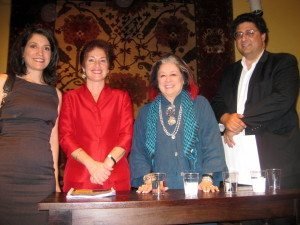WEST HOLLYWOOD, Calif.—It was a special evening on Oct. 13, as invited guests gathered at the Tufenkian Carpets showroom here for a program devoted to “Women’s Empowerment in Armenia.” The program featured a guest appearance by U.S. Ambassador to Armenia Marie Yovanovitch, and was jointly organized by the Armenian International Women’s Association (AIWA), the Tufenkian Foundation, and the U.S. Agency for International Development (USAID). The three organizations recently co-launched a Women’s Support Center in Yerevan that works to combat domestic violence. The center served as the main focal point of the evening.

Opening the program was Tufenkian Foundation director Antranig Kasbarian, who welcomed the guests, explained the gathering’s purpose, and introduced the guest speakers. He also introduced Diane Cabraloff, AIWA’s Los Angeles chair, who offered brief words of welcome on AIWA’s behalf.
In his remarks, Kasbarian emphasized the seriousness of violence against women in Armenia, noting that it is often correlated to heightened poverty and social dislocation and dysfunction among families. He added that Armenian society has been slow in combating the problem, often downplaying or denying its existence despite abundant evidence to the contrary.
He then briefly introduced the new Women’s Support Center, which is supervised by the “Zangakatun” (Belltower) NGO and funded through a matching grant from USAID. Although in its infancy, the center has already helped over 30 women, providing an array of support services to help them cope, confront, or combat violence and related problems. Kasbarian added that the center would not be a reality without early encouragement from Yovanovitch, following a conversation between her and AIWA Board member Joan Agajanian Quinn.
Kasbarian was followed by Carla Garapedian, the noted producer of films such as “Screamers” as well as “Lifting the Veil,” the latter devoted to violence against women in Afghanistan. Garapedian welcomed the renewed focus on this issue, noting its contemporary relevance. (Only days earlier, news headlines depicted the brutal murder of a Yerevan woman by her husband and mother-in-law.)
Garapedian was followed by Yovanovitch, who stressed that domestic violence, like other social issues, deserves greater attention and activism from Armenians both in homeland and diaspora. She welcomed the newly established center, noting her pride in being associated with it.
The program was accompanied by a mini-exhibit of photos by Sara Anjargolian, the noted photographer and producer of “How We Live,” a multimedia depiction of poverty in Armenia today.
Following the program, audience members took the opportunity to mingle with the featured guests, posing questions and becoming better acquainted. Overall, the gathering maintained a balance between lively festivity and sober reflection, celebrating the new collaboration while acknowledging the seriousness of the topic at hand.
The reception was preceded by a spirited informational gathering, where community leaders—mostly women—exchanged views on women’s issues with Yovanovitch and the other featured guests. The evening was made possible through the hard work of AIWA’s organizing committee—Joan Quinn, Diana Hekimian, Ani Aivazian, and Lily Balian—who were assisted by Tufenkian staff.


Oh, great. Armenian women’s empowerement? What a joke. Just another excuse to spread propaganda in Armenia. The less of it we get, the better.
The moderator refuses to let the phrase feminist propaganda go through. Either delete my post, or let it through un-modified.
Levon Ter-Isahakyan,
strong and confident women are a valuable asset for any society. What’s the reason for your anger?
Gina,
Who said I’m angry? Just because I criticize feminism doesn’t mean I’m angry. Care to prove to me why your assessment is nothing more than name calling (which many feminists love to engage in when involved in any type of discussion).
Now, before we go any further with our discussion, please define what you mean by strong and confident women. What is that strength, how is it shown, and how can it be used. Secondly, what is a confident woman, how is that confidence portrayed, and how it can be used.
Finally, prove the statement you have made. If you are one of those “strong and confident” women, I’m sure you’ll have absolutely no problem with giving a clear, logical proof of your statement without having to resort to “name calling”, “biased statistics”, and similar “unproven statements” from others express the same ideas as you.
Am I correct in my assessment that you most likely spend a significant amount of time in a western culture? Probably, since your name is Gina. In other words, for a large portion of your life you have been subjected to Feminist propaganda, and told that it is the holy grail of truths, and anyone who disagrees must be angry, hateful, can’t get women, <insert other derogatory comments here>. I would ask you to look at the ideas you have, and try to see if you can prove their truthfulness. And I mean prove, as in, prove in a way that can be abstracted from things like gender, man, woman, human, society, etc. A proof that can be expressed mathematically. In other words, a proof, and not a collection of feelings expression how things should be, thus that’s how they are.
Thanks
Levon, men have been rulers, and more all these generations of humanity… and now, look at the ‘veejag’ of the world, warring, genocides,dishonesty and more. Manooshag